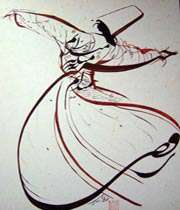The Mawlawi Sufi Order
The Mawlawi Sufi order (Mawlawiyah or Mevlevi, as it is known in Turkey) was founded in 1273 by Rumi"s followers after his death.
His first successor in the rectorship of the order was Husam Chalabi himself , after whose death in 1284 Rumi"s younger and only surviving son, Sultan Walad (died 1312), favorably known as author of the mystical Masnawi Rababnama, or the Book of the Rabab, was installed as grand master of the order. The leadership of the order has been kept within Rumi"s family in Konya uninterruptedly since then. The Mawlawi Sufis, also known as Whirling Dervishes, believe in performing their dhikr in the form of sama'. During the time of Rumi (as attested in the Manaqib ul-Arefin of Aflaki), his followers gathered for musical and "turning" practices.
Rumi was himself a notable musician who played the robab, although his favorite instrument was the ney or reed flute. The music accompanying the sama' consists of settings of poems from the Masnawi and Diwan-e Kabir, or of Sultan Walad"s poems. The Mawlawiyah was a well-established Sufi order in the Ottoman Empire, and many of the members of the order served in various official positions of the Caliphate. The center for the Mawlawiyyah was in Konya. There is also a Mawlawi monastery (درگاه, dargah) in Istanbul near the Galata Tower in which the sama' is performed and accessible to the public. The Mawlaw? order issues an invitation to people of all backgrounds:
“ Come, come, whoever you are,
Wanderer, idolater, worshiper of fire,
Come even though you have broken your vows a thousand times,
Come, and come yet again.
Ours is not a caravan of despair.”
Rumi"s tomb in Konya, Turkey.During Ottoman times, the Mawlawiyah produced a number of notable poets and musicians, including Sheikh Ghalib, Ismail Rusuhi Dede of Ankara, Esrar Dede, Halet Efendi, and Gavsi Dede, who are all buried at the Galata Mawlawi Khana (Turkish: Mevlevi-Hane) in Istanbul. Music, especially that of the ney, plays an important part in the Mawlawiyyah.

With the foundation of the modern, secular Republic of Turkey, Mustafa Kemal Atatürk removed religion from the sphere of public policy and restricted it exclusively to that of personal morals, behavior and faith. On 13 December 1925, a law was passed closing all the tekkes (or tekeyh) (dervish lodges) and zawiyas (chief dervish lodges), and the centers of veneration to which pilgrimages (ziyarat) were made. Istanbul alone had more than 250 tekkes as well as small centers for gatherings of various fraternities; this law dissolved the Sufi Orders, prohibited the use of mystical names, titles and costumes pertaining to their titles, impounded the Orders" assets, and banned their ceremonies and meetings. The law also provided penalties for those who tried to re-establish the Orders. Two years later, in 1927, the Mausoleum of Mevlana in Konya was allowed to reopen as a Museum.
In the 1950s, the Turkish government began allowing the Whirling Dervishes to perform once a year in Konya. The Mawlana festival is held over two weeks in December; its culmination is on 17 December, the Urs of Mawlana (anniversary of Rumi"s death), called Shabe Arous (شب عروس) (Persian meaning "nuptial night"), the night of Rumi"s union with God. In 1974, the Whirling Dervishes were permitted to travel to the West for the first time.
Source: wikipedia.org